#privacy rights
Text
🗣️ This is for all new internet connected cars
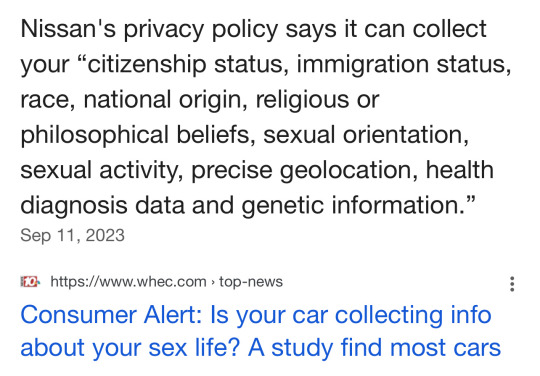
A new study has found that your car likely knows more about you than your mom. That is disconcerting, but what’s even more so is what is being done with your information. It’s all about the Benjamins. Our private information is being collected and sold.
The Mozilla Foundation, a non-profit that studies internet and privacy issues, studied 25 car manufacturers. And it found every manufacturer sold in America poses a greater risk to your privacy than any device, app or social media platform.
Our cars are rolling computers, many of which are connected to the internet collecting information about how you drive and where. New cars also have microphones and sensors that give you safety features like automatic braking and drowsy driver detection. Those systems are also providing information. Got GPS or satellite radio? Then your car likely knows your habits, musical and political preferences.
Did you download your car’s app which gives you access to even more features? Well that also gives your car access to your phone and all the information on it.
The study found that of the 25 car brands, 84% say they sell your personal data.
And what they collect is astounding.
One example the study sites is KIA’s privacy policy. It indicates the company collects information about your sexual activity. I initially didn’t believe it until I pulled KIA’s privacy policy and read it. And it’s right there in black and white. It says it collects information about your “ethnicity, religious, philosophical beliefs, sexual orientation, sex life, or political opinions.
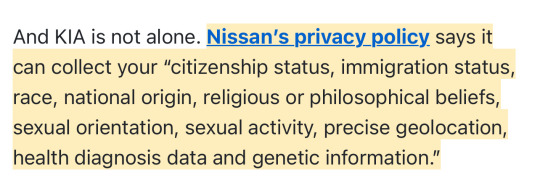
And it says it can keep your info for “as long as is necessary for the legitimate business purpose set out in this privacy notice.”
Translation: Nissan can keep your information as long as they want to. And more than half of the manufacturers (56%) say they will share your information with law enforcement if asked.
(continue reading) more ↵
#politics#data mining#smart cars#spyware#privacy rights#surveillance state#new cars#big brother#nissan#kia#connected cars#consumer alert#panopticon
9K notes
·
View notes
Text
This is not a drill

This is IMPORTANT especially if you live in the USA or use the internet REGULATED by the USA!!!!
Do not scroll. Signal boost. Reblog.
Reblog WITHOUT reading if you really can't right now, I promise all the links and proof are here. People NEED to know this.
( I tried to make this accessible but you can't cater to EVERYONE so please just try your best to get through this or do your own research 🙏)
TLDR: Homeland Security has been tying our social media to our IPs, licenses, posts, emails, selfies, cloud, apps, location, etc through our phones without a warrant using Babel X and will hold that information gathered for 75 years. Certain aspects of it were hushed because law enforcement will/does/has used it and it would give away confidential information about ongoing operations.
This gets renewed in September.
Between this, Agincourt (a VR simulator for cops Directly related to this project), cop city, and widespread demonization of abortions, sex workers, & queer people mixed with qanon/Trumpism, and fascism in Florida, and the return of child labor, & removed abortion rights fresh on our tails it's time for alarms to be raised and it's time for everyone to stop calling us paranoid and start showing up to protest and mutual aid groups.
🚨🚨🚨🚨🚨🚨🚨🚨🚨🚨
These are the same feds who want to build cop city and recreate civilian houses en masse and use facial recognition. The same feds that want cop city to also be a training ground for police across the country. Cop city where they will build civilian neighborhoods to train in.
Widespread mass surveillance against us.
Now let's cut to some parts of the article. May 17th from Vice:
Customs and Border Protection (CBP) is using an invasive, AI-powered monitoring tool to screen travelers, including U.S. citizens, refugees, and people seeking asylum, which can in some cases link their social media posts to their Social Security number and location data, according to an internal CBP document obtained by Motherboard.
Called Babel X, the system lets a user input a piece of information about a target—their name, email address, or telephone number—and receive a bevy of data in return, according to the document. Results can include their social media posts, linked IP address, employment history, and unique advertising identifiers associated with their mobile phone. The monitoring can apply to U.S. persons, including citizens and permanent residents, as well as refugees and asylum seekers, according to the document.
“Babel data will be used/captured/stored in support of CBP targeting, vetting, operations and analysis,” the document reads. Babel X will be used to “identify potential derogatory and confirmatory information” associated with travelers, persons of interest, and “persons seeking benefits.” The document then says results from Babel X will be stored in other CBP operated systems for 75 years.
"The U.S. government’s ever-expanding social media dragnet is certain to chill people from engaging in protected speech and association online. And CBP’s use of this social media surveillance technology is especially concerning in connection with existing rules requiring millions of visa applicants each year to register their social media handles with the government. As we’ve argued in a related lawsuit, the government simply has no legitimate interest in collecting and retaining such sensitive information on this immense scale,” Carrie DeCell, senior staff attorney at the Knight First Amendment Institute, told Motherboard in an email.
The full list of information that Babel X may provide to CBP analysts is a target’s name, date of birth, address, usernames, email address, phone number, social media content, images, IP address, Social Security number, driver’s license number, employment history, and location data based on geolocation tags in public posts.
Bennett Cyphers, a special advisor to activist
organization the Electronic Frontier Foundation, told Motherboard in an online chat “the data isn’t limited to public posts made under someone’s real name on Facebook or Twitter.”
The document says CBP also has access to AdID information through an add-on called Locate X, which includes smartphone location data. AdID information is data such as a device’s unique advertising ID, which can act as an useful identifier for tracking a phone and, by extension, a person’s movements. Babel Street obtains location information from a long supply chain of data. Ordinary apps installed on peoples’ smartphones provide data to a company called Gravy Analytics, which repackages that location data and sells it to law enforcement agencies via its related company Venntel. But Babel Street also repackages Venntel’s data for its own Locate X product."
The PTA obtained by Motherboard says that Locate X is covered by a separate “commercial telemetry” PTA. CBP denied Motherboard’s FOIA request for a copy of this document, claiming it “would disclose techniques and/or procedures for law enforcement investigations or prosecutions”.
A former Babel Street employee previously told Motherboard how users of Locate X can draw a shape on a map known as a geofence, see all devices Babel Street has data on for that location, and then follow a specific device to see where else it has been.
Cyphers from the EFF added “most of the people whose location data is collected in this way likely have no idea it’s happening.”
CBP has been purchasing access to location data without a warrant, a practice that critics say violates the Fourth Amendment. Under a ruling from the Supreme Court, law enforcement agencies need court approval before accessing location data generated by a cell phone tower; those critics believe this applies to location data generated by smartphone apps too.
“Homeland Security needs to come clean to the American people about how it believes it can legally purchase and use U.S. location data without any kind of court order. Americans' privacy shouldn't depend on whether the government uses a court order or credit card,” Senator Ron Wyden told Motherboard in a statement. “DHS should stop violating Americans' rights, and Congress should pass my bipartisan legislation to prohibit the government's purchase of Americans' data." CBP has refused to tell Congress what legal authority it is following when using commercially bought smartphone location data to track Americans without a warrant.
Neither CBP or Babel Street responded to a request for comment. Motherboard visited the Babel X section of Babel Street’s website on Tuesday. On Wednesday before publication, that product page was replaced with a message that said “page not found.”
Do you know anything else about how Babel X is being used by government or private clients? Do you work for Babel Street? We'd love to hear from you. Using a non-work phone or computer, you can contact Joseph Cox securely on Signal on +44 20 8133 5190, Wickr on josephcox, or email [email protected].
Wow that sounds bad right.
Be a shame if it got worse.
.
.
It does.
The software (previously Agincourt Solutions) is sold by AI data company Babel Street, was led by Jeffrey Chapman, a former Treasury Department official,, Navy retiree & Earlier in his career a White House aide and intelligence officer at the Department of Defense, according to LinkedIn.
🙃
So what's Agincourt Solutions then right now?
SO FUCKING SUS IN RELATION TO THIS, THATS WHAT

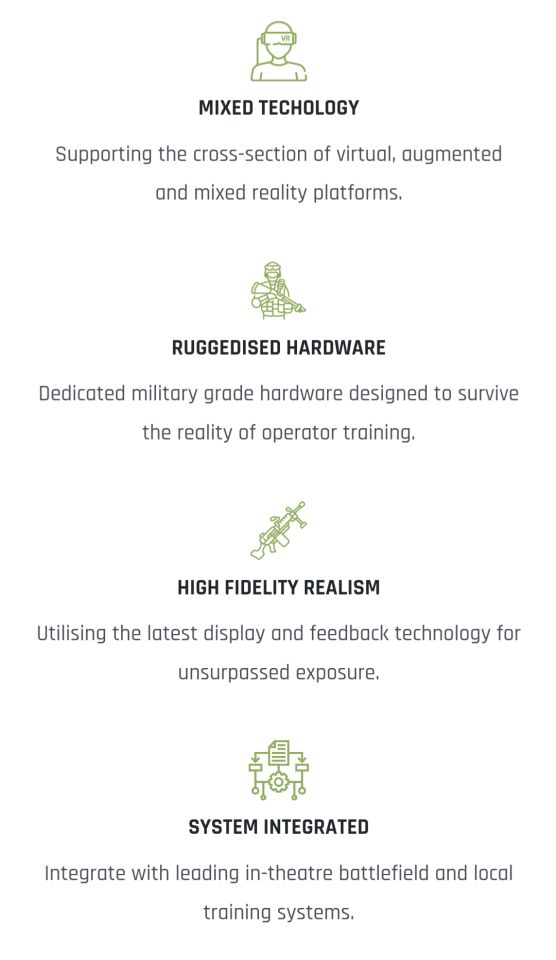
In essence, synthetic BATTLEVR training is a mixture of all three realities – virtual, augmented and physical. It is flexible enough to allow for mission rehearsals of most types and be intuitive enough to make training effective.
Anyway the new CEO of Babel Street (Babel X) as of April is a guy named Michael Southworth and I couldn't find much more on him than that tbh, it's all very vague and missing. That's the most detail I've seen on him.
And the detail says he has a history of tech startups that scanned paperwork and sent it elsewhere, good with numbers, and has a lot of knowledge about cell networks probably.
Every inch more of this I learn as I continue to Google the names and companies popping up... It gets worse.
Monitor phone use. Quit photobombing and filming strangers and for the love of fucking God quit sending apps photos of your actual legal ID to prove your age. Just don't use that site, you'll be fine I swear. And quit posting your private info online. For activists/leftists NO personally identifiable info at least AND DEFINITELY leave your phone at home to Work™!!!
#current events#capitalism#USA#politics#facism#public surveillance#anarchists#democrats#lgbt#direct action#leftist#ndn#indigenous#lesbian#gay#trans#bisexual#neurodivergent#Feminism#privacy rights#human rights#internet#tumblr#signal boost#desantis#florida#queer#refugees#immigration#threads
7K notes
·
View notes
Text
On TikTok, PimEyes has become a formidable tool for internet sleuths trying to identify strangers, with videos notching many millions of views showing how a combination of PimEyes, and other search tools, can, for example, figure out the name of a random cameraman at a Taylor Swift concert.
What. the Absolute. FUCK.
123 notes
·
View notes
Text
i was born to do journaling in aesthetic notebooks and write my heart out in diaries but desi household me maa baap sab padh lete hai
#desiblr#desi aesthetic#random rants#desi shit posting#desi stuff#desi tumblr#random thoughts#rant post#my rants#desi household#privacy rights#girl thoughts#desi girl#girlcore#girlblogging
22 notes
·
View notes
Text
The Spy Who Shushed Me: How the Government Is Removing Our Right to Read in Private
On the Links Between FBI's Controversial Library Awareness Program, the Patriot Act, and Book Bans Today

by Anthony Aycock
It isn’t often that libraries, those citadels of quiet refinement, play a role in capturing a serial killer. Yet that is what happens in the movie Se7en. William Somerset, played by Morgan Freeman, is a veteran detective charged with training a newcomer, David Mills, played by Brad Pitt. Their first case: a pair of murders inspired by two of the Seven Deadly Sins, gluttony and greed. After the third killing (sloth), the duo is nowhere close to solving the case. They don’t even have a suspect.
Then Somerset gets an idea. “What would [the killer] study,” he muses, “to do the things he’s done?” For an answer, he turns to a FBI friend, who uses an unnamed database to run a report of public library users who have borrowed books like Paradise Lost, The Inferno, Helter Skelter, Murderers and Madmen, Dictionary of Catholicism—anything that could account for their killer’s skill set. “How is this legal?” asks Mills, to which Somerset replies dismissively, “Legal, illegal….These terms don’t apply.”
Several hours later, report in hand, Mills and Somerset end up at the apartment of John Doe (Kevin Spacey), who fires a gun at them and flees. Later, covered in blood, he turns himself in. Somerset’s trick worked! (Small comfort, as���spoiler alert—the blood on his clothes had belonged to Mills’s wife.)
For years, I thought this sequence was fantasy. I was certain the FBI didn’t have some mysterious database of all U.S. libraries that could spit out the borrower record of any one user. Besides, why would the government care what people read?
My skepticism, it turns out, was unfounded.
READ MORE
56 notes
·
View notes
Text
To turn off AI on mobile:
Navigate to the mobile view of your account page (you should see your account name, bio, etc)
Hit the gear in the upper right
Scroll down and tap on "Visibility"
Turn off "prevent third party sharing"
If you don't see it yet, refresh tumblr/force quit the app
28 notes
·
View notes
Text
Remember Plaid?
Since our last Tumblr update on it was a while back, here's a few important points on what we know.
Plaid has faced scrutiny, criticism, and legal action regarding their privacy policies and treatment of users' personal data.
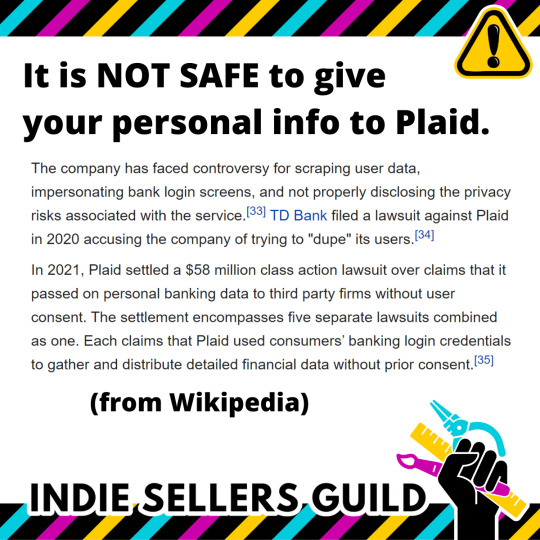
As of March 2023, Etsy is still pushing Plaid as a bank verification method for US based sellers.
This is supposedly to the end of complying with anti money laundering regulations in the US, but the ISG has had trouble finding any new laws or regulations that apply to established sellers, or any evidence that Plaid specifically is necessary for this.
While this isn't strictly required to verify your bank account, what's being presented to sellers outright is a process that involves giving your bank account password and username directly to Plaid. Again, this incredibly unsafe process is not necessary to verify with Plaid. You can verify with the standard two micro deposit method instead if you choose to do so. This is much safer.
Near the beginning of January, the ISG produced and published a video detailing all of this further with instruction and advice on what to do if you don't want to simply comply with Etsy's sketchy behavior. I'll embed the video in a follow-up reblog so as not to get stuck in Tumblr's search function.
#Sketchy etsy#Etsy sellers#small business#Workers rights#Privacy rights#indie sellers guild#etsy#Plaid update
32 notes
·
View notes
Text
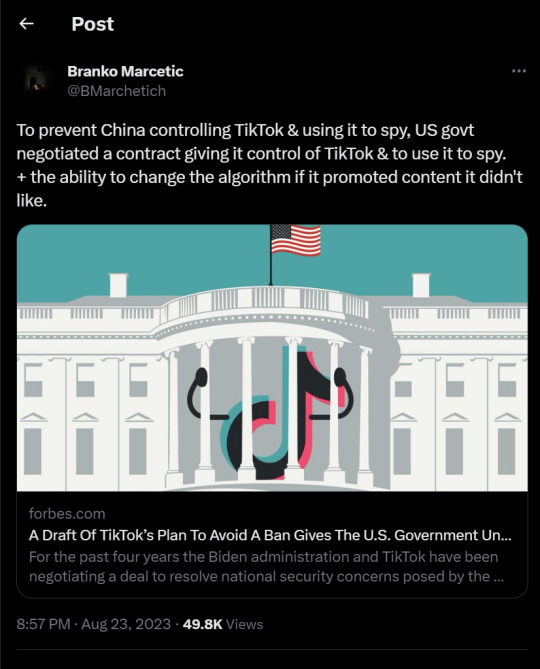
how long yall letting this kabuki theatre you call freedom & democracy go on?
#politics#mass surveillance#propaganda#privacy rights#tiktok#data mining#freedom and democracy#inverted totalitarianism#twitter#us politics#press freedom#twitter x
12 notes
·
View notes
Video
youtube
BetterHelp Shares Your Data With Facebook
#mental health#videos#self harm#suicide#privacy rights#abuse#psychological abuse#emotional abuse#homophobia#betterhelp#facebook#meta#apps#phone apps#patient rights
31 notes
·
View notes
Link
The Trump Republican governor of Virginia apparently wants to know your menstrual history.
Gov. Glenn Youngkin (AKA: Trumpkin) has derailed a bill preventing Virginia police from seeking the menstrual histories of women in the state. This has everything to do with the extremist GOP position on abortion.
The Republican governor of Virginia, Glenn Youngkin, appears to have thwarted an attempt to stop law enforcement obtaining menstrual histories of women in the state.
A bill passed in the Democratic-led state senate, and supported by half the chamber’s Republicans, would have banned search warrants for menstrual data stored in tracking apps on mobile phones or other electronic devices.
Advocates feared private health information could be used in prosecutions for abortion law violations, after a US supreme court ruling last summer overturned federal protections for the procedure.
But Youngkin, who has pushed for a 15-week abortion ban to mirror similar measures in several Republican-controlled states, essentially killed the bill through a procedural move in a subcommittee of the Republican-controlled House.
Citing unspecified future threats to the ability of law enforcement to investigate crime, Maggie Cleary, Youngkin’s deputy secretary of public safety, told the courts of justice subcommittee it was not the legislature’s responsibility to restrict the scope of search warrants.
Republican womb radicals are still calling the shots on reproduction in the party.
“While the administration understands the importance of individuals’ privacy … this bill would be the very first of its kind that I’m aware of, in Virginia or anywhere, that would set a limit on what search warrants can do,” she said, according to the Washington Post.
“Currently any health information or any app information is available via search warrant. And we believe that should continue to be the case.”
The panel voted on party line to table the bill, meaning it is unlikely to resurface during the current legislative session.
Youngkin/Trumpkin has been mentioned as a possible 2024 GOP presidential candidate. He can’t afford to offend the hardline fundamentalist Christians who make up a considerable percentage of the extremist GOP base.
The GOP complains that vaccine mandates go against people’s free-dumb. Somehow they see no contradiction in demanding menstrual histories – provided they can find an overzealous fundamentalist cop willing to brandish a warrant.
The only way to permanently protect reproductive rights in the United States is to vote Democratic in every election and never to miss an election — for any level of government.
#glenn youngkin#virginia#abortion#trumpkin#maggie cleary#republicans#the gop#womb radicals#menstrual histories#privacy rights#the sanctity of reproductive freedom#a woman's right to choose#reproductive rights#election 2024
27 notes
·
View notes
Text
TW: government "oversight", tracking of private data
I hate how fearmongering and straight up lying is used to trick people into thinking that everything they do is NOT watched by authorities and/or corporations.
Cookies, in your browser, track you. Anything used for advertising? It's tracking you. If you disable cookies, they "fingerprint" your browser based on your operating system and features you have on your browser.
I've had old friends try to bring up "oooooo imagine if the government watches what you are doing".
They already do. It's observation en masse, but it exists.
There is a law a lot of larger countries have (in capitalist/socialist heavy areas) where governments get around not being able to "spy" on their own people by sharing information about other governments' citizens with other governments.
There is a main 5 countries, then one referred to as "9 eyes", and then an additional 5 (referred as 14 eyes).
A VPN only hides your location. If you change nothing about your behavior, it's useless for making your internet activity discreet, if that's why you are using it.
Disabling cookies in your browser makes it hard to be tracked, but if you have things that are unique about your browser (the theme, addons/extensions, settings), it doesn't do much overall other than reduce how targeted the ads you receive are.
Using Tor as a browser does nothing if you use it like a normal browser. Even the guide to Tor explains this.
If you want to be seen as "invisible", you need to do this:
Use a specific browser for the invisible activity (ex. researching political parties, shopping, researching controversial topics in your country). Do not ever use this browser for anything else. This browser needs to have an ad blocker used by at least several million people. Any extensions need to be used by millions of people. For best results, use a Virtual Machine which will have a different serial number than yours. Before you open the browser, turn on your VPN (or change it to a specific country of which you always use and only use for that browser). Ensure that you leave all settings to default other than disabling cookies and, if you want to be more careful, disabling JavaScript. If you disable JavaScript, you will find that most of the internet is much more difficult to navigate. But, your browser will not be able to share as much if you do.
What I just described is almost exactly what is explained by Tor in how they explain to use the Tor browser. I struggle to understand why, I have friends that are also highly familiar with software and web development, and should know how tracking works, that still fall into being fearmongered over their personal information being tracked.
If you are using the internet, you are being tracked. What matters for how easily it identifies you, is how much information about you is kept all together. Which, most people have almost all their information together.
Remember that information is "en masse", meaning that generally specific details are not restricted to individual people.... but if you want the tracking to not carry between say different online accounts - keep them separate.
2 notes
·
View notes
Text

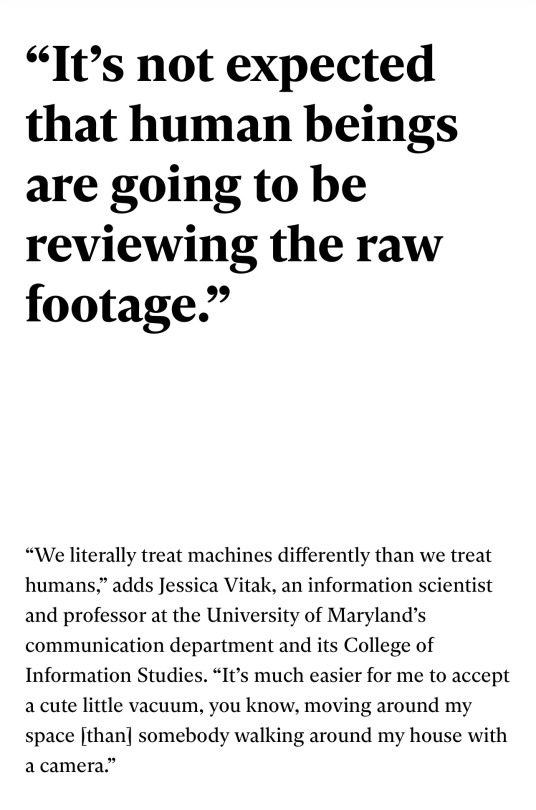


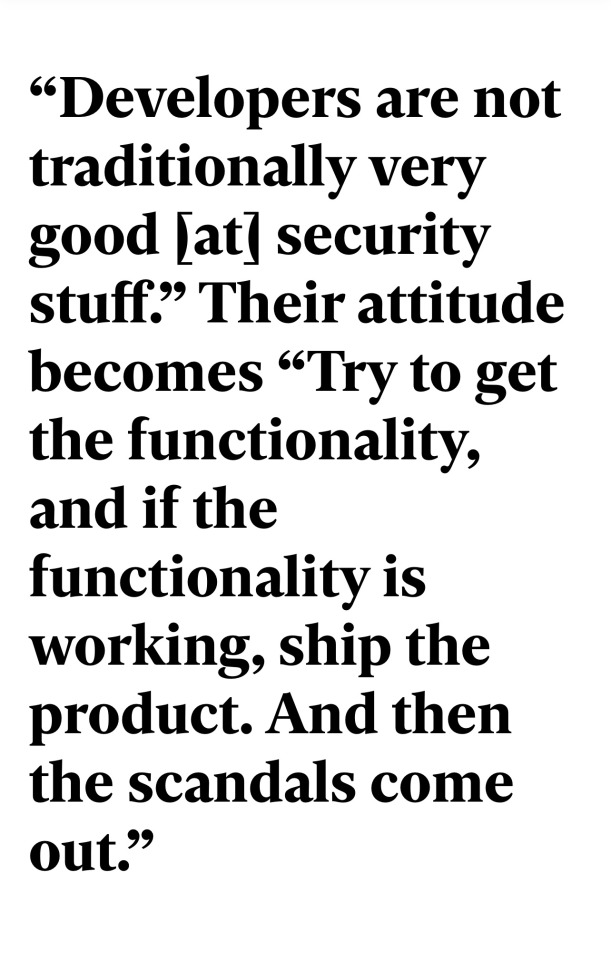
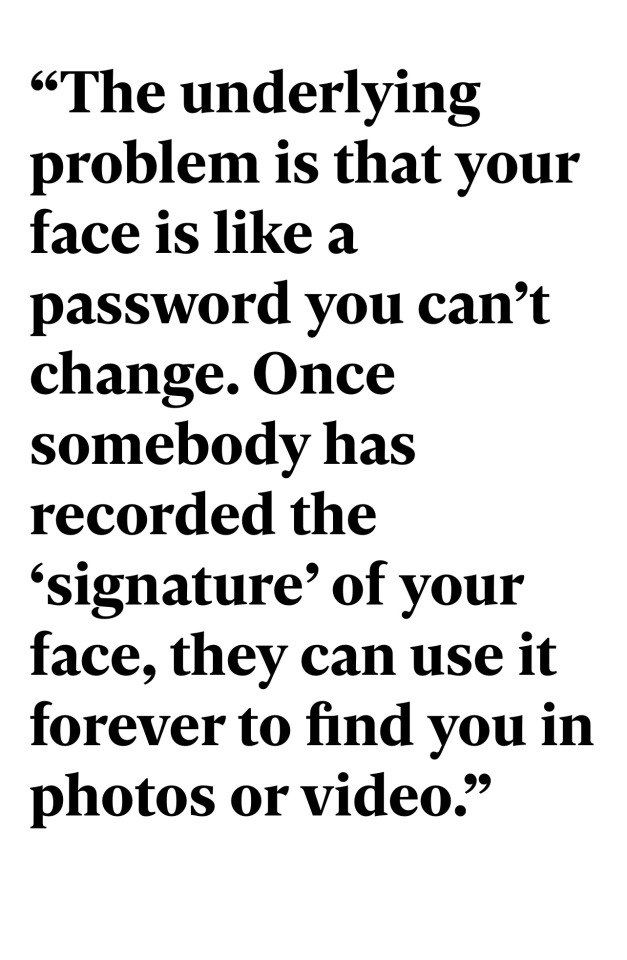
IN THE FALL OF 2020, GIG WORKERS IN VENEZUELA POSTED A SERIES OF images to online forums where they gathered to talk shop. The photos were mundane, if sometimes intimate, household scenes captured from low angles—including some you really wouldn’t want shared on the Internet.
In one particularly revealing shot, a young woman in a lavender T-shirt sits on the toilet, her shorts pulled down to mid-thigh.
The images were not taken by a person, but by development versions of iRobot’s Roomba J7 series robot vacuum. They were then sent to Scale AI, a startup that contracts workers around the world to label audio, photo, and video data used to train artificial intelligence.
They were the sorts of scenes that internet-connected devices regularly capture and send back to the cloud—though usually with stricter storage and access controls. Yet earlier this year, MIT Technology Review obtained 15 screenshots of these private photos, which had been posted to closed social media groups.
The photos vary in type and in sensitivity. The most intimate image we saw was the series of video stills featuring the young woman on the toilet, her face blocked in the lead image but unobscured in the grainy scroll of shots below. In another image, a boy who appears to be eight or nine years old, and whose face is clearly visible, is sprawled on his stomach across a hallway floor. A triangular flop of hair spills across his forehead as he stares, with apparent amusement, at the object recording him from just below eye level.

iRobot—the world’s largest vendor of robotic vacuums, which Amazon recently acquired for $1.7 billion in a pending deal—confirmed that these images were captured by its Roombas in 2020.
Ultimately, though, this set of images represents something bigger than any one individual company’s actions. They speak to the widespread, and growing, practice of sharing potentially sensitive data to train algorithms, as well as the surprising, globe-spanning journey that a single image can take—in this case, from homes in North America, Europe, and Asia to the servers of Massachusetts-based iRobot, from there to San Francisco–based Scale AI, and finally to Scale’s contracted data workers around the world (including, in this instance, Venezuelan gig workers who posted the images to private groups on Facebook, Discord, and elsewhere).
Together, the images reveal a whole data supply chain—and new points where personal information could leak out—that few consumers are even aware of.
(continue reading)
#politics#james baussmann#scale ai#irobot#amazon#roomba#privacy rights#colin angle#privacy#data mining#surveillance state#mass surveillance#surveillance industry#1st amendment#first amendment#1st amendment rights#first amendment rights#ai#artificial intelligence#iot#internet of things
5K notes
·
View notes
Text
Victory! California’s new data broker law will hold data brokers accountable and give us needed control over our data by making it easier to exercise our privacy rights.
Read more about what the new law does here:
#privacy #databrokers #CA
#privacy#data brokers#california#usa#america#law#humanrights#invasion of privacy#privacy rights#ausgov#politas#auspol#tasgov#taspol#australia#fuck neoliberals#neoliberal capitalism#anthony albanese#albanese government#native american#amerikkka#amerika#united states#unitedstateofamerica#class war#eat the rich#eat the fucking rich#fuck the gop#fuck the police#fuck the patriarchy
3 notes
·
View notes
Text
Yesterday was a very sad day in US history, with Roe v Wade and abortion rights overturned. The implications for young people in the US are enormous and we stand with you. It was not only abortion rights, but also gun control and Miranda rights (the right to have a lawyer with you if questioned by the police) that have been struck down. There is reason for concern also about LGBTQ+ rights being overturned in years to come and it is absolutely essential that different communities unite and fight this. We will in the coming week(s) be reblogging any resources for impactful activism that we come across. Saying you hate this on Facebook isn’t going to be enough - we’ll need to DO things and get on the streets. For LGBTQ+ rights, for black lives, for women’s rights, for native peoples, for gun control. Please let us know about any resources you think deserve a platform.
37 notes
·
View notes
Text
Can a private clinic be profitable?
A diagnosis is a beginning to provide a medication based on a medicine.
A patient can have a consultation with a same profession according to an expertise based on the medicine.
Do you want a brand name in a correct manner?
An author Piotr Sienkiewicz
+48 721 951 799

#An economy#A complaint#A consumer#Consumers#A law#A verification licence#A medicine#Swtzerland#Austria#Germany#Netherlands#nederlands#Norway#Sweden#Denmark#A private service#A private sector#Privacy rights
2 notes
·
View notes
Text
oh btw everyone, the draft opinion from the Supreme Court ALSO directly cites a bunch of other cases as “appeals to a broader right of autonomy” in order to “define one’s ‘concept of existence’” as “too much…those criteria, at a high level of generality, could license fundamental rights to illicit drug use, prostitution, and the like…none ofthese rights has any claim to being deeply rooted in history.”
the list of cases (on pages 31-32 of the opinion) includes but is not limited to:
Loving v. Virginia (case legalizing interracial marriage)
Griswold v. Connecticut (people are allowed to get contraceptives)
Skinner v. Oklahoma ex rel. Williamson (right not to be forcibly sterilized)
Lawrence v. Texas (people have the right to engage in consensual, private sexual acts, which was mainly about LGBTQIA+ Americans)
and Obergefell v. Hodges (legalizing same-sex marriage)
so yes, this is even worse than initially thought.
#abortion#us Supreme Court#us politics#current events#privacy rights#interracial marriage#what the actual fuck#lgbtqia+ rights#contraceptives#fucking SCARY
36 notes
·
View notes